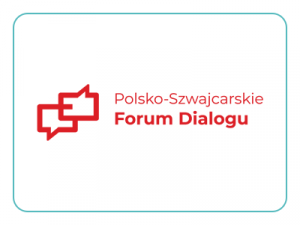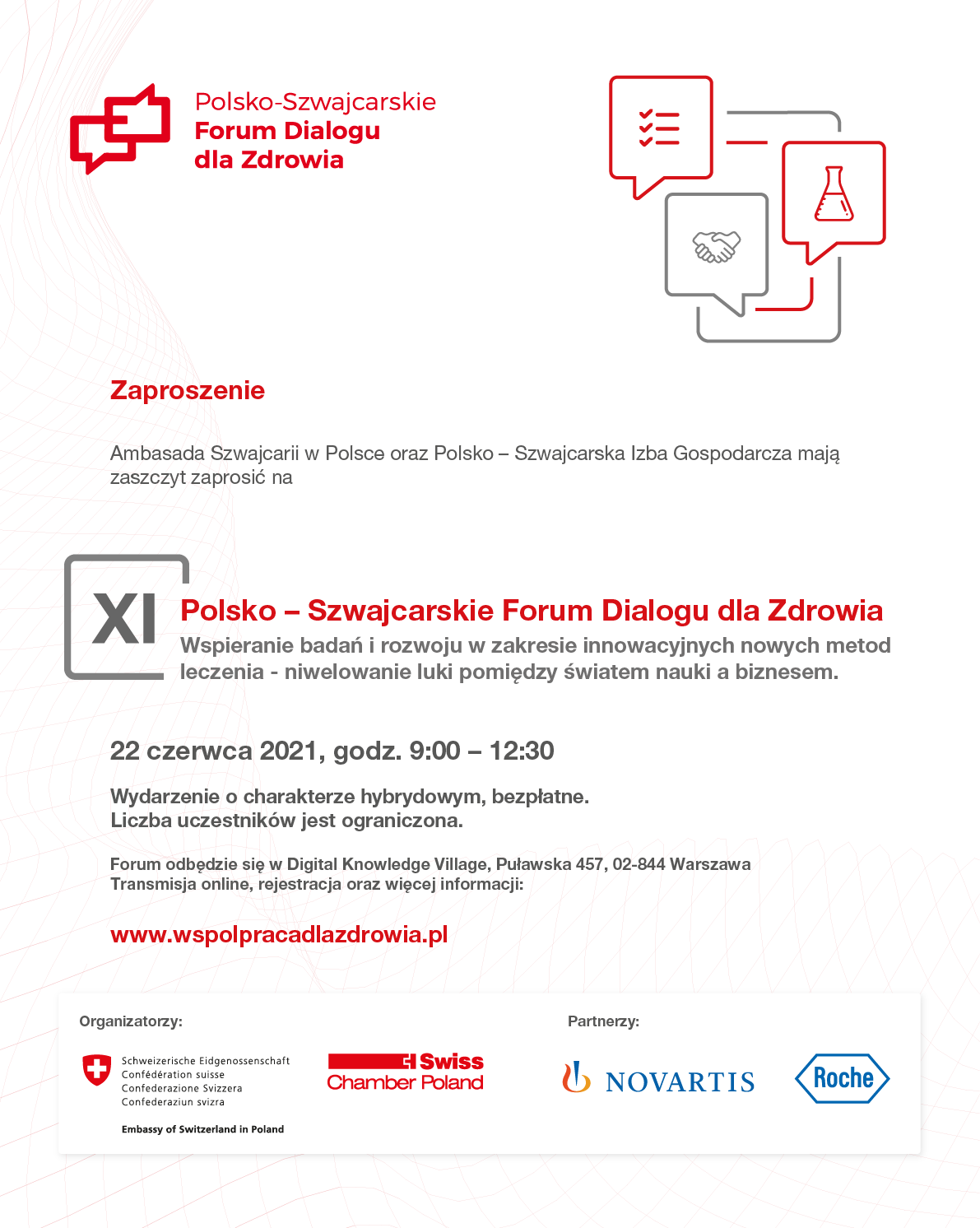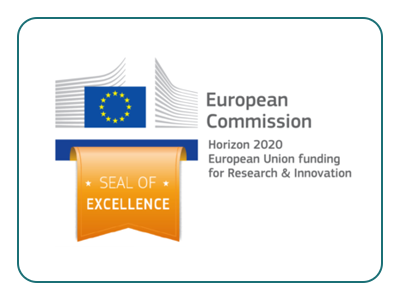
The Polish-Swiss Forum for Health Dialogue
dr hab. med. Michał Wszoła prelegentem podczas 11.edycji Polsko-Szwajcarskiego Forum
June 22 marked the 11th. edition of the Polish-Swiss Forum of Dialogue for Health.
How to bridge the gap between researchers and entrepreneurs – key question 11. edition of the Polish-Swiss Forum of Dialogue for Health
Poland has great potential in pharmaceutical production and late-stage clinical trials. Scientists are making promising discoveries, but bringing them to market is proving problematic. What could Poland do to bridge the gap between academia and the private sector? How can Poland strengthen its research and development (R&D) and start-up ecosystem in pharmaceuticals and life sciences? Among other things, these questions will be answered by experts during the 11th. Polish-Swiss Forum for Health to be held on June 22, 2021.

Speakers at the June Forum will be representatives of both Polish and Swiss institutions and companies:
- Piotr Arak, Director of the Polish Economic Institute,,
- Jürg Burri, Swiss Ambassador to Poland,
- Piotr Dardzinski, President of the Lukasiewicz Research Network
- Bart Dzikowski, Managing Director of Novartis Venture Fund,
- Neil Goldsmith, Director Strategy BaseLaunch,
- Liliane Brunner Halbach, Expert in global pharma and life-sciences,
- Jacek Jemielity, President of ExpoRNA Therapeutics,
- Jan Krzewinski, CEO of Polpharma Biologics Gdansk,
- Jordi Montserrat, Co-Founder and Managing Partner at Venturelab,
- Radoslaw Sierpinski, acting president of the Medical Research Agency,
- Michał Stępień, President of the Board of Directors of the Polish-Swiss Chamber of Commerce, Country Head UBS Poland,
- Michal Walczak, Co-Founder and Chief Scientific Officer of Captor Therapeutics,
- Ph. med Michal Wszola, transplant surgeon, President and Founder of Polbionica,
- Irma Verberič, Roche General Manager.
Deleted: The speed with which scientists, governments and pharmaceutical companies are working together to develop and implement diagnostics, therapies and vaccines for the new SARS-CoV-2 virus is historically unparalleled. This is possible because the threat to public health and the global economy posed by this particular virus is unprecedented: this sense of urgency has helped raise unprecedented resources. When the pandemic subsides and the world finally emerges from crisis mode, there will be many conditions and diseases for which there is no effective and efficient treatment available. There is even no therapy. However, there is optimism that medical research is growing rapidly, for example, in the field of biotechnology. It is difficult to overestimate the economic and social benefits that progress in this area can bring. That is why it is so important to skillfully use scientific and research potential and create conditions for the development of cooperation between research centers and business.
Inviting the Forum, Pablo Padrutt, Head of the Economic, Financial and Scientific Section of the Swiss Embassy in Poland, says: “There is no modern health care without diagnostics, vaccines and treatments. When a scientist discovers something that can help patients, what happens next? What does it take to translate a scientific discovery into an effective product? In many countries, the gap between scientists and entrepreneurs remains very wide. As the most innovative country in the world, Switzerland can share a lot of interesting experiences and knowledge on how to support R&D for new treatments and effectively bridge the gap.”
The Roche Regional Clinical Research Center for Central and Eastern Europe, which handles clinical trials in 11 countries, is based in Warsaw. Poland thus plays a significant role in Roche’s global product development strategy. The company is giving patients access to clinical trials at the first Early Phase Research Unit in Poland at the Cancer Center-Institute. It’s a cutting-edge oncology agent that allows scientists to actively participate in the development of new drugs at such an early stage.
Novartis coordinated the certification of three centers in Poland treating with CAR-T cells. The CAR-T method uses the patient’s own immune system and advanced genetic engineering to fight cancer through genetically modified T cells. For adult patients, these include the Department of Hematology and Bone Marrow Transplantation at the Poznan University of Medical Sciences, the Department of Bone Marrow Transplantation and Oncohematology at the National Institute of Oncology in Poznan. Maria Sklodowska-Curie (Gliwice Branch). The Cape of Hope in Wroclaw is at the moment the only pediatric center in Poland where CAR-T can be treated. Four Polish children have already received CAR-T cells. Experts estimate that, thanks to CAR-T, about 50 percent. patients, leukemia patients and approx. 40 percent. patients with lymphomas (DLBCL and ALL), are likely to achieve permanent remissions.
Deleted:Novartis is conducting most of its globally launched clinical trials in Poland, with the number of trials increasing each year. Poland’s R&D intensity remains significantly higher than the EU average of 3 percent. The company’s commitment to supporting the development of the biotechnology sector shows that Poland is a key market in Central and Eastern Europe for Novartis.
Deleted: The two companies have been committed to fostering dialogue between the private and government sectors for many years. Just from the history of the Dialogue Forum itself, one can see how great the need for such an agreement is. Ulrich Schwendimann, Managing Director of the Polish-Swiss Chamber of Commerce, sums up 11 years of joint activities: “Since 2011, the Polish-Swiss Forum of Dialogue for Health has covered a very wide range of topics, from preventive medicine and health promotion, to the implementation of oncology strategies, to data-driven healthcare and pandemic management. In all, more than 100 policymakers and experts from Poland and Switzerland met at the Forum to reflect on current trends and challenges in healthcare. More than 1,000 participants experienced a lot of cross-fertilization and learning from the perspective of different stakeholders from our two countries.”
Innovation as a priority in the National Reconstruction Plan
The benefits of cooperation between research and development centers and the business world seem obvious. The tangible results of this cooperation, such as the implementation of innovative solutions, access to the latest knowledge or higher product quality cannot go unnoticed. The exchange of experiences and the opportunity to develop scientists who can use their inventions in practice is also extremely important.
The benefits of cooperation between research and development centers and the business world seem obvious. The tangible results of this cooperation, such as the implementation of innovative solutions, access to the latest knowledge or higher product quality cannot go unnoticed. The exchange of experiences and the opportunity to develop scientists who can use their inventions in practice is also extremely important.
The benefits of cooperation between research and development centers and the business world seem obvious. The tangible results of this cooperation, such as the implementation of innovative solutions, access to the latest knowledge or higher product quality cannot go unnoticed. The exchange of experiences and the opportunity to develop scientists who can use their inventions in practice is also extremely important.
Polish-Swiss Dialogue Forum</em><em> is an annual initiative to discuss the shape and direction of reforms in the Polish health care system and to develop a model of stakeholder relations based on open dialogue, drawing on the Swiss experience. The event, organized by the Swiss Embassy in Poland and the Polish-Swiss Chamber of Commerce, allows an exchange of views and a joint discussion among those involved in the health care system in Poland on solutions tailored to the needs of Polish society. The event is dedicated to the medical community, medical experts, scientists, entrepreneurs, patient organizations, health-promoting associations and foundations.
Roche and Novartis are partners in the event.
More information about the Forum at:
//forumdialogue.swisschamber.pl/

